 Fighters of Lanzhou MAC in confrontation training
Fighters of Lanzhou MAC in confrontation training
 3D printing to trigger third industrial revolution
3D printing to trigger third industrial revolution
 Top 10 brands that win rich women's hearts
Top 10 brands that win rich women's hearts
 Deng Xiaoping: 'I have a clear conscience all my life'
Deng Xiaoping: 'I have a clear conscience all my life'
 Xi Jinping: 'The people are our strength'
Xi Jinping: 'The people are our strength'
 Amazing cliff diving in cold winter
Amazing cliff diving in cold winter
 Enjoy Sochi 2014 in slow motion
Enjoy Sochi 2014 in slow motion
 University student sentenced to death for poisoning roommate
University student sentenced to death for poisoning roommate
 Chinese lunar New Year celebrated in San Francisco
Chinese lunar New Year celebrated in San Francisco
While China grieved and expressed its outrage following the savage stabbing of innocent civilians by Xinjiang separatists at the crowded railway station in southwest China's Kunming Saturday night, some Western media organizations, including CNN, Associated Press, the New York Times, and the Washington Post, were already presenting their audiences and their readership with a distorted view of events.
The terrorist attack that occurred on Saturday night at the train station in southwest China's Kunming city left at least 29 innocent civilians dead and more than 130 injured. The deadly attack was orchestrated by Xinjiang separatist forces. This was an act of terrorism directed against the whole of humanity, civilization and society.
The international community strongly condemned this cruel attack, but the coverage of the incident by a few Western media organizations, including CNN, Associated Press, The New York Times, and the Washington Post was dishonest and appeared to be directed by ulterior motives. Emanating from such loud advocates of "the fight against terrorism", the coverage was insulting and has led to widespread resentment in China.
There was extensive evidence at the crime scene to leave no doubt that the Kunming Railway station attack was nothing other than a violent terrorist crime. But regardless of this evidence, some western media organizations were unwilling to use the word "terrorism" in their coverage. CNN's report on March 3 put the word "terrorists" in quotation marks, and offered the view that "mass knife attacks" are "not unprecedented" in China. The intention here was to associate this terrorist incident with a number of attacks that occurred in 2010 and 2012, all the more disgusting because these attacks happened at schools, they were conducted by individuals who were clearly mentally disturbed, and their victims were children. None of the perpetrators had any political connections, or any political motives. The Associated Press report used the term "described by the authorities as" to qualify their use of the word "terrorists". The New York Times and the Washington Post called the terrorists "attackers".
In their depictions of the background to the attack, CNN, the New York Times, and the Washington Post all ignored the significant social progress that has been made in Xinjing, instead focusing on the problem of "relations between China's ethnic groups".
Faced with such tragedy and such unambiguous facts, it is a hard-hearted and cynical media that would engage in such hypocrisy. Don't they love to talk about "human rights"? Did they not see the pictures of innocent victims lying in pools of their own blood? Did they show even the slightest concern for the victims and their "human rights"? Should such an event occur in America, how would they respond to the incident? Would they be quite so coy about describing the murderers as "terrorists"?
Prejudice has long been deep-rooted among Americans observers of issues related to Xinjiang. Not so very long ago, the American government passed three Uyghur prisoners detained in Guantanamo Bay to Slovakia, despite China's opposition. These suspects are all members of an group called the "East Turkistan Islamic Movement", recognized by the UN Security Council as a terrorist organization. For far too long the American government's logic has been that such people are only "terrorists" when the harm they are doing is being done to the US. The US government has always refused to describe bloody incidents involving Xinjiang separatists as "terrorist incidents"; it prefers to direct its criticism towards China. The American government's sympathetic attittude to Xinjiang separatists has undoubtedly provided the terrorist shadow of these groups with a boost. Should not the American government and its media revise their attitudes after the Kunming Railway Station tragedy?
On the issue of terrorism and terrorists, the double standards adopted by the United States and some Western media organizations cause actual harm to others, while providing them with neither benefit nor credit. They would do well to hope that their conduct and their attitudes do not ever rebound back on themselves.
The article is edited and translated from 《十足的虛偽與冷酷》, source: People's Daily, author: Wen Xian.
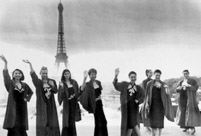 Old photos: Precious moments in Sino-French ties I
Old photos: Precious moments in Sino-French ties I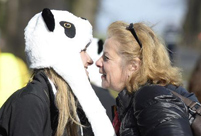 Belgians warmly welcome arrival of China's giant pandas
Belgians warmly welcome arrival of China's giant pandas Photos: Top 10 pure beauties in showbiz
Photos: Top 10 pure beauties in showbiz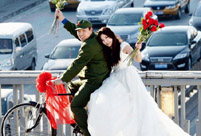 Chinese Dream: the Chinese Spirit and the Chinese Way
Chinese Dream: the Chinese Spirit and the Chinese Way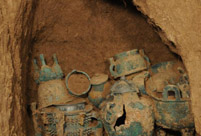 51 bronze sacrificial utensils unearthed in Shaanxi
51 bronze sacrificial utensils unearthed in Shaanxi Most gorgeous female celebs in Chi-pao
Most gorgeous female celebs in Chi-pao Second round of test kicks off at Beijing Film Academy
Second round of test kicks off at Beijing Film Academy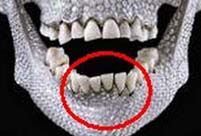 Ancient Qiang people had vertically grown teeth
Ancient Qiang people had vertically grown teeth Top 10 Chinese youth’s favorite seaside destinations
Top 10 Chinese youth’s favorite seaside destinations Sacrificial altar unearthed in China's Shannxi
Sacrificial altar unearthed in China's Shannxi Chinese warplanes C919 to appear at Singapore Airshow
Chinese warplanes C919 to appear at Singapore Airshow North China Sea Fleet conducts anti-submarine drill
North China Sea Fleet conducts anti-submarine drill Ruins of Shang Dynasty's structure unearthed in Shaanxi
Ruins of Shang Dynasty's structure unearthed in Shaanxi  Stunning figure skating in Sochi
Stunning figure skating in Sochi Intercity high speed train in operation
Intercity high speed train in operationDay|Week|Month